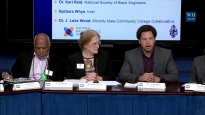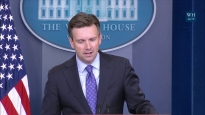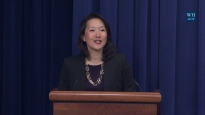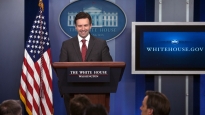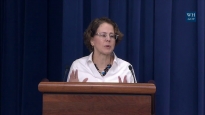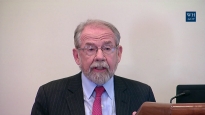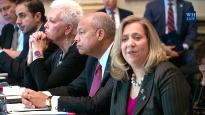Press Briefing 10/7/09
October 7, 2009 | 43:36
White House Press Briefings are conducted most weekdays from the James S. Brady Press Briefing Room in the West Wing. (public domain)
Download mp3 (40MB)
Briefing by White House Press Secretary Robert Gibbs, 10/7/09
THE WHITE HOUSE
Office of the Press Secretary
____________________________________________________________________
For Immediate Release October 7, 2009
____________________________________________________________________
For Immediate Release October 7, 2009
PRESS BRIEFING
BY
PRESS SECRETARY ROBERT GIBBS
BY
PRESS SECRETARY ROBERT GIBBS
James S. Brady Press Briefing Room
2:26 P.M. EDT
MR. GIBBS: One quick series of announcements before we get going. I want to walk you through just a scheduling thing for the middle of November.
The President, as you know, will be traveling to Asia next month to strengthen our cooperation with this vital part of the world on a range of issues of mutual interest. The President will begin his trip in Tokyo, Japan, on November 12th and 13th. We leave here on the 11th.
The President's visit will provide an opportunity to deepen coordination with this key ally on a range of economic, security and other issues. The President will meet for a second time with the Japanese Prime Minister.
The President will travel from Japan to Singapore for the annual Asia Pacific Economic Cooperation -- APEC -- meeting from November 13th to 15th. APEC is an important forum that brings together the economies of the Pacific Rim, and Singapore is an important partner on a range of regional and global issues. He will meet with leaders from the APEC member economies and business leaders from the Asian Pacific region. We'll also take the opportunity to hold bilateral meetings with leaders from Singapore and other partners. The President will hold his first-ever meeting between a U.S. President and leaders of the 10 Southeast Asian nations that make up the ASEAN, the Association of Southeast Asian Nations.
The President will then travel to China where he will visit Beijing and Shanghai from November 15th through the 18th. The President will hold his third bilateral meeting with President Hu Jintao to discuss ways to address challenges and expand cooperation on key bilateral regional and global issues, including security, nonproliferation, energy and climate change.
Finally, the President will visit Seoul, South Korea on November 18th through the 19th. This visit will provide an opportunity to hold his third bilateral meeting with President Lee and consult on North Korea to coordinate on a range of regional and global issues and to further strengthen the U.S.-Korean alliance. The President also looks forward to meeting with U.S. servicemen and women stationed in Korea.
Lastly, let me raise the issue of Indonesia. President Obama met with the Indonesian President briefly at the G20 summit in Pittsburgh and discussed the President's intention to visit Indonesia. They agreed on the importance of having a visit that would showcase the importance of a growing U.S.-Indonesian bilateral relations. After reviewing the possibilities they agreed the best time for such a visit would be sometime next year at a date to be mutually determined by each side.
So that is --
Q When does he get back?
MR. GIBBS: What is the -- I can't remember if it's the 19th or the 20th. Let me check on that.
Q A question on that, Robert? On the Japan trip, specifically, is there any possibility of the President considering a trip to Hiroshima or Nagasaki --
MR. GIBBS: That's all the guidance I have thus far, so I don't have anything past that. But we'll, as we get closer, fill in some of the blanks.
Yes, ma'am.
Q On this meeting this afternoon, focused on Pakistan, as you said. In public statements, the administration has focused a lot on being encouraged that Pakistan has shown more cooperation this year on fighting extremists inside its borders. But also you've seen some signs too that there is still very much controversy. For example, today there was --
MR. GIBBS: I'm sorry, say the last part one more time.
Q Signs that there is difficulty and controversy within Pakistan about doing that, and some of that has emerged today with comments by Pakistan's military and others about this aid bill. And I'm wondering how much that side of the debate, that side of the challenge of Pakistan, is on the agenda today.
MR. GIBBS: Look, I think all aspects of our posture and policy toward Pakistan and its link to Afghanistan and the regional conflict that we're dealing with -- I think, as you mentioned, as we talked about in a readout of the meeting -- the most previous meeting in the Situation Room, one of the things that we spent a lot of time discussing was the increase in cooperation that we've received from the Pakistanis, their much greater willingness to engage extremists within their own country, and the progress that we were making. Obviously I think these topics that you mentioned, I think there's a -- Congress has passed the Kerry-Lugar authorization for Pakistani assistance, which the President will sign quite -- very shortly.
Q (Inaudible.)
MR. GIBBS: We posted the bill online. I don't know when the five-day period that we've talked about expires, but the President -- whenever that is, the President will sign that legislation. But I expect that that will -- all of these topics will be discussed there.
Q And what's the -- can you give us some details? We know the folks who are going to be in there because you guys put that out. How long is it supposed to be? What sort of --
MR. GIBBS: It's a three-hour meeting that starts at 3:30 p.m. and I would expect it to -- I don't expect it to go shorter than three hours. So it's scheduled for 3:30 p.m. to 6:30 p.m., but could last a little longer than that.
Q The Pentagon says the President now has McChrystal's troop request. Can you tell us anything more about his time frame for making a decision on that?
MR. GIBBS: The President received from Secretary Gates General McChrystal's resource request last Thursday afternoon prior to traveling to Copenhagen. So he's had it for a number of days. I think as the President talked in the members meeting yesterday and as we've discussed with you, we're going to go through this process of evaluating the goals and the strategy and at that point -- at a point after that, we'll get to discussing resources.
Q Can you tell us what the request was for?
MR. GIBBS: No.
Q Did you tell Bob Woodward? (Laughter.)
Q A question about the meeting --
MR. GIBBS: Wasn't me, my friend.
Q -- that the President had today on the economy with Pelosi and Reid.
MR. GIBBS: I'm sorry, say that again.
Q The meeting on the economy with Pelosi and Reid.
MR. GIBBS: I admit -- they met obviously in the Oval Office. I have not talked to the President about the topic or what was discussed there.
Q Okay. The way the meeting has been described to us by people on the Hill, they say that the meeting was called to discuss ways to stimulate the economy. And you've been steering us away from the idea that a stimulus is under consideration, a second stimulus. I'm just wondering how that squares --
MR. GIBBS: Let me talk to folks that were in the meeting and talk with the President and get a little bit better read on what the meeting was about.
Yes, sir.
Q Yesterday Senator McCain, after he came out from that meeting, talked about Afghanistan being a big test for the President --
MR. GIBBS: It's a big test for the country.
Q So does the President -- does the administration agree with that assessment -- a test for the President?
MR. GIBBS: Well, first of all, let's understand and acknowledge that today marks the eighth year of our country's involvement militarily with Afghanistan. I think we're all forever indebted to the men and women that have served in that country, some of whom have paid the ultimate sacrifice. This is not a test for one person, this is not a test for one entity. This is a test for our country to adequately address and correctly address the extremist threat that emanates from Afghanistan and Pakistan.
It's one the President takes seriously and one the President is going to use his time to get right. You have heard Secretary Gates say this, other said this in the meeting yesterday -- that until the President's review of this early in the administration there hadn't been a strategy, a coordinated strategy to deal with Afghanistan and this very dangerous region of the world for many, many years. And that's what the President is intent on getting right.
Q This summer the President had dinner with some historians, and one of them said that he told the President that "War kills off great reform movements." How concerned is the administration that perhaps Afghanistan could overshadow some of the other key things that this administration is trying to do -- health care, energy reform?
MR. GIBBS: I don't know whether the quote is accurate, I wasn't at the dinner.
Q But to the point of war overshadowing -- Afghanistan overshadowing all of these other critical things that the --
MR. GIBBS: I think this President understands quite keenly that he was elected to address whatever problems, foreign and domestic, confronted this country. When we assumed office a few months ago we were involved, and still are, in two wars. We face a very challenging economy that at one point obviously was at the brink of sliding into a second depression. Each and every day we deal with things here that challenge our country and call on us to -- call on us to seek better solutions than we have in the past, and that's what our charge is.
I don't -- I think there's so much going on and there's so much, again, foreign and domestic, that I don't -- I don't believe anything will overshadow -- I don't think one particular thing will overshadow the complexity of all the problems that have to be dealt with.
Q Robert, yesterday in his speech the President said that because of our efforts, al Qaeda and its allies have lost operational capability. What did he mean by that? Does he mean that they've lost -- or capacity, rather -- does he mean that they've lost the capacity to strike?
MR. GIBBS: I'm not going to get into discussing intelligence, but I think we have, as I was talking about with Jennifer, made through cooperation with the Pakistanis great progress in dealing with and downgrading and degrading al Qaeda. But I'm not going to get much further into intelligence matters.
Q And the other question I think all of us want to know: Are they going to discuss those numbers today at all in this meeting?
MR. GIBBS: I doubt it. But I'll have a better sense, obviously, when the meeting is over, but that's -- not that I'm aware of that's on the docket today.
Q Apparently Taliban officials issued a statement today on the eighth anniversary, saying that they did not then and they still have no agenda to harm other countries. Some are interpreting that as separating themselves from al Qaeda and arguing that they present no danger to the United States. Do you expect that, the issue of the separation between al Qaeda and Taliban, to be a major topic of conversation today? And what's the framework for that debate?
MR. GIBBS: Well, look, I think the -- likely the conversation will continue to discuss the threats that are posed by a myriad of groups in this region, the operational capabilities of each. And as the President talked about yesterday, his primary focus is on groups and their allies that can strike our homeland, strike our allies, or groups who would provide safe haven for those that wish to do that.
Q Do you expect different players here to be arguing for their points of view? For example, will Joe -- do you expect Vice President Biden to be arguing in favor of a more counterterrorism-heavy approach? Do you expect the generals to be arguing for their --
MR. GIBBS: You know, this may not be good TV, but there really weren't any arguments in the last three-hour meeting. There was a larger discussion of where we are and what we need to do going forward. So I can't predict who's going to yell at who.
Q I'm not talking about yelling, I just mean forcefully stating, just as McChrystal did in his London speech. Is he taking that kind of -- do you expect the generals to take that kind of approach and say, this is what we need to do?
MR. GIBBS: Again, I don't expect that we'll get into resource requests today. I think we'll get into a firm analysis of where we are in Pakistan, the steps that have been taken by the Pakistani government through greater cooperation, but obviously steps that -- and progress that has to continue to happen in order to continue to confront extremists in their country.
Q I'm just trying to get a little better sense of the tone in the room. I mean, some people will see this as kind of -- you know, the President is there as kind of a judge and a jury, and you've got two different sides or however many different sides making their arguments, and then it's up to him to decide who's right.
MR. GIBBS: I think you're thinking of that great movie version of Harper Lee's "To Kill a Mockingbird," but I don't quite see the movie setting that you've described. Last time there were, as I said, 17 people in addition to the President spoke. I don't think -- nobody raised their voice. Nobody -- there was just a sort of calm discussion about where we are. I expect that that will continue today.
Q But is it clear in the room that there are serious disagreements on how to go about this?
MR. GIBBS: Not that I saw last week. But, again, we're in a process of going through this fairly systematically. I should have mentioned this the other day, I was -- I think everybody is waiting for people to walk out of a room and give everybody a number and that that's the only debate we're having, though I was struck when we were having this discussion earlier in the week and the question focused on the partnership, the willing partnership of the Afghans. And I thought to myself, well, if you look at some of what's -- the coverage of what's going on, there's no discussion about the complexity of the problem, the multi-layered aspects of it, and that's what we're digging into.
This is a longer conversation that will -- each of the meetings this week is scheduled for three hours. It's a complex problem that doesn't have a simple one-sentence answer.
Q Next week's meeting -- do you know yet what day that's going to be?
MR. GIBBS: I don't, but we will -- I will check on that.
Q And that is not necessarily the last meeting?
MR. GIBBS: Not necessarily. I don't know -- I'll check with scheduling and see what other -- I don't know how far out, honestly, they've scheduled stuff.
Q And it's still several weeks before he makes a decision?
MR. GIBBS: Yes.
Q You make a -- (laughter) --
Q I have no --
MR. GIBBS: There's nothing left, right?
Q When do you expect the discussion to turn to troop levels?
MR. GIBBS: It could happen as early as Friday, it could be next week; I don't know.
Q When the President announces a strategy -- which I presume is still a matter of weeks, correct? Will he announce the troop levels at that same time, or will there be an additional period of time --
MR. GIBBS: I don't think we've gotten that far down the road yet.
Q As you look at the strategy, is it somewhat artificial to take the resources question out of the discussion? In other words, as you abandon strategies it seems inherent in that, that you would say, this requires X amount of resources, this is what it would take --
MR. GIBBS: Well, I think one has to develop and get the strategy before one can figure out the resources one needs to get it.
Now, again, inherent in what I just said was we're not -- we're not prejudging the outcome of the discussion based on some range of resource requests. I think we've done and we've all seen what happens when you prejudge what's going to happen, dedicate a certain number of troops -- and then come up with a strategy. That doesn’t tend to have been successful in military history.
Q But talking about strategy totally unmoored to questions of resources sounds a little academic.
MR. GIBBS: I don't think that's -- I don't think it's academic at all. I think you -- one has to get a strategy that works. One has to get a strategy that has the confidence of all of those involved. At that point you discuss the resources that are needed to implement that strategy.
But the President is very content not to do this backwards, not to pick a number of troops and then divine a strategy; but instead to go through this in a rigorous way, through an assessment -- like he did in March, that had an additional 21,000 troops going to a region to stabilize the country in preparation for an important election, and then at that point we would reassess where we were.
Q The final thing, as the President goes through this deliberative process -- and I know he wants to take his time -- is he concerned about the message that is sent to U.S. troops when the talk is getting the strategy right? I mean, inherent in that is that there's either no strategy right now or that this is a flawed strategy that they're executing and frankly fighting and dying for. Is he concerned about that perception?
MR. GIBBS: Look, again, I think what's important to note is -- as was noted again in the meeting yesterday -- that there was a three-month process whereby President Bush went through the same --
Q I know he's not comparing himself to President Bush --
MR. GIBBS: No, no, I'm simply providing for you some historical context about the evaluations, assessments and ultimately the resource decisions that one makes in order to follow a strategy.
Q Is that how he measures what he should do?
MR. GIBBS: No, the President is going to do this in a way that's deliberative. I'm simply pointing out that some people that say that -- I don't -- I guess I don't recall some people saying that a few years ago when a different Commander-in-Chief -- but maybe -- maybe I missed that --
Q I'm just asking -- as opposed to what happened in the past, what message he wants the troops to have about this process --
MR. GIBBS: We want to get this right; that once and for all, after eight years, we're going to get -- we're going to get a strategy that -- and understand this, this is -- a good portion of the discussion today is going to also involve what has to happen at a civilian level -- obviously that includes the governmental level -- and what has to happen at a diplomatic level. That's why two of the participants -- two of the participants last week from the region were Ambassador Eikenberry and our ambassador from Islamabad, along with Susan Rice.
It's not just a military question. It has to be looked at and focused on, on a number of different areas at a number of different levels. And that's what the President is intent on doing.
Yes, sir.
Q Robert, could you provide a readout, please, on the meeting with Speaker Pelosi and Senator Reid with the President on jobs and the economy?
MR. GIBBS: Yes, I just a minute ago said that I had not had a chance to talk to the President about that. So I won't do the "Jeopardy!" version of this and guess before I know.
Q Robert, did yesterday's meeting with congressional leaders give the President the feeling that there is a political component to his decision on a new strategy?
MR. GIBBS: No, I think the President valued hearing from experts in Congress representing military, representing intelligence, representing the appropriations process. I think most of the participants mentioned that this was a -- that they understood that this was a important decision for the country. And they went through different aspects. The President I think spent most of his time listening to, in about an hour-and-15-minute meeting, listening to the thoughts that different participants had. I think 18 different people spoke in addition to the President and the Vice President in offering their ideas and their assessments at where we were in each aspect of Afghanistan and Pakistan.
Q Do you expect the President to hear from President Zardari and Karzai at some point?
MR. GIBBS: Well, we're in fairly regular contact with them and their government, so I assume that certainly they'll be part of the process.
Yes, ma'am.
Q The meeting with Reid and Pelosi, not asking what happened, but how did it come about? Was it requested by the White House? Was it requested by --
MR. GIBBS: I still don't know the answer to the meeting.
Q Was it on the schedule yesterday or was it the last-minute --
MR. GIBBS: I believe it was, but I'd have to check. I did not look at the President's schedule yesterday.
Q Okay. And also, could you -- is there any sense of urgency among meetings with the President and his advisors right now about the need to look at other ways to spur job growth? Is that sense of urgency the same now as it was a month or two ago?
MR. GIBBS: I think the -- the urgency in getting our economy moving again now is the same urgency that, quite frankly, the economic team had the first day we walked in here and, quite frankly, started in the transition in a number of meetings in Chicago, understanding, again, the depth of where we'd been and what had to happen in order to get the economy moving again and creating jobs for the future.
Q But not just the economy, but specific to jobs, is there any heightened sense of urgency that this could be a jobless recovery?
MR. GIBBS: Again, we -- I don't think you have -- I don't think you have to be at a meeting in the White House to understand the urgency with which we've seen job loss during this recession. Again, the last positive month of job growth we had was the month prior to the official recording of the beginning of the recession I think back in December of 2007. There's been an urgency around that, quite frankly, around the campaign.
Q And The New York Times reported today that there's been some traction for the idea of a tax credit for companies that increase their payrolls. Can you talk about how that's being considered?
MR. GIBBS: No. (Laughter.) Thank you.
Q You're welcome.
Q You have some Republican lawmakers saying for the President to fund, if you will, less than General McChrystal's entire troop request would be a half measure and the worst of all possible outcomes. What's your reaction to that?
MR. GIBBS: I appreciate the opportunity to do hypotheticals. I don't see the need to do that at a point until a decision gets made.
Q What's our relationship with the Karzai government right now? Did we -- did we recognize the election? Is he --
MR. GIBBS: There, as I understand it, are still two committees investigating fraud -- one internal in Afghanistan, an international committee that are still probably many days away or several days away from a determination. Our position remains the same, and that is that we believe that every vote should be counted, we believe that fraud should be investigated vigorously and that those votes found to be fraudulent should be thrown out and not counted.
Q So what does that mean our position with his government is as of now?
MR. GIBBS: Well, until the election is determined, he's the leader of the country and we continue to work with him.
Q If I understand correctly, last Wednesday's meeting the President began by saying, we're not going to talk specifically about resources. The next day he asked --
MR. GIBBS: Well, no, no, no, he -- the beginning of the meeting he dispensed with the notion that we were pulling out of or leaving Afghanistan.
Q No, not yesterday, last week's --
MR. GIBBS: No, last week, too.
Q Okay.
MR. GIBBS: The President -- we just haven’t gotten to the period or the point in which in these meetings we've discussed specific troops requests.
Q Okay. The next day he asked for --
MR. GIBBS: He received from Secretary Gates --
Q But he requested it at some point, right, because it's still working its way officially through the chain of command.
MR. GIBBS: I don't know when he requested it or -- the assessment had at that point I believe had been delivered the previous week or so to Admiral Mullen, I think, who went to Europe to receive it. I don't have all these dates --
Q But why did he request it before it was officially up through the chain of command?
MR. GIBBS: Well, it was handed to him by the Secretary of Defense, so I -- that's the top of the chain of command.
Q That he was going to hold onto that, though, until this process ended --
MR. GIBBS: And the President wanted to see it before then.
Q Can you tell us why? It was on the eve of his meeting with General McChrystal the next day?
MR. GIBBS: Yes. I think he wanted to take a look at it.
Q And the debate that's taking place in Pakistan today around the civilian aid package -- are you concerned, is the White House concerned about the military in a country that over half of its 62 years has been under military rule, again asserting itself in this debate and saying it's American meddling, you know, be skeptical of this?
MR. GIBBS: No, obviously it demonstrates we've still got work to do. But the President believes that this is an important initiative -- again, understanding the parlance this is an authorization not an appropriation, so there is still progress that has to be made. The President did mention yesterday that this was just an authorization and that if we're going to deal with civilian capacity and diplomatic challenges in both Afghanistan and Pakistan then those that support the policy have to step up and support providing the resources in terms of this money, to ensure that that happens.
Q Robert, looking ahead to the weekend, the President will speak to the Human Rights Campaign. There is still considerable upset amongst some of the gay community over little progress on issues like reversing "don't ask, don't tell," which was a campaign promise. And I also think domestic partner benefits.
MR. GIBBS: That's being worked on as we speak with OPM and through the administration.
Q I guess what I want to ask you is what if anything will the President have to announce on Saturday night with respect to those two issues or any others, in terms of progress being made.
MR. GIBBS: I have not seen a draft circulated of the speech as of yet. But Sheryl, I can tell you, look, the President made commitments on those issues not just quite frankly in a presidential race but ran on some of those commitments in a Senate race. They are commitments that are important to him and he is intent on making progress on those issues and is working with the Pentagon to ensure at least in "don't ask, don't tell" that we make progress on it.
Q And you said that the other issue, the domestic partner, is being worked on right now with OPM. So at what -- I mean, are you close to announcing a rule?
MR. GIBBS: I can check with OPM. I can check with OPM on that.
Q Yesterday after the congressional meeting Senator Reid said that everyone in the room said, we're going to support you no matter which way you go, basically -- and then Nancy Pelosi said, well, we're going to reserve judgment to see what he sends up. I'm wondering if the President feels confident that he'll have the support he needs from his own party after he makes whatever decision --
MR. GIBBS: I think the President said in this meeting that whatever decision he makes is not likely to make everybody happy. I think that's probably safe to say on either end of the political spectrum.
Q Yes, but leaving some people unhappy is different than getting the support he needs from them. I'm just wondering if he feels that even if there is some dissent he'll still have the backing he needs from Democrats.
MR. GIBBS: Well, look, he did mention that as many people in the room mentioned their support for his March decision to send more troops, he did mention quite specifically to members in the House that were in attendance in the meeting that he did not recall that the funding bill for that request -- that he didn't recall, I think he said, that slid through the House.
So I definitely think -- I don't think this is a challenge or an onus just on one side of this. I think -- and I don't want to prejudge what decisions are made, but obviously it would be a period of evaluation for all members.
Q Just one other question about the process. You said earlier he wants to get a strategy that works and that everyone is confident in. Does he -- does he see his role in these meetings as getting -- coming to kind of a consensus on a strategy, or just taking in all this different information and then making a decision on his own?
MR. GIBBS: I think, quite frankly, he'll do some of each. But I think obviously as he mentioned yesterday, this is the decision for him as Commander-in-Chief to make.
Yes, sir.
Q I have two quick questions, or one quick question on Afghanistan and one slightly longer one. Just the quick one would be, just to clarify, is the proper way to understand maybe a debate or conversation going on right now on Afghanistan, is it between counterinsurgency strategy or counterterrorism strategy? Is that a correct way to think about this?
MR. GIBBS: Well, look, the Vice President himself made the point yesterday that nobody was, including himself, was talking about exclusively a counterterrorism strategy, which in the parlance of military planners would be to extract large numbers of troops that are there; use primarily mechanics and special forces. Nobody -- the Vice President said nobody that he knows of, including himself, is advocating that.
Q That's helpful. I could go on, but I want to ask this other question as far as Afghanistan goes. Steve Hadley made the point to me that when they were planning the surge in 2006, they had a long period of time in which that was a private process not open to the public's knowledge and speculation; and that because this process that you guys are going through is public, it creates room for questioning allies, enemies are questioning resolve, troops are questioning the mission. Was this process made public because of the leak of the McChrystal report? Has there been any consideration that it might have been done more effectively in private? I know that's "would of" but --
MR. GIBBS: I mean, yes, I mean -- could of, would of, should of, I guess. You know, I hate to parse the words of Secretary Gates on this. I think he's spoken clearly on this. But this is a process whereby the President is going to make a decision that he thinks is in the best interest of this country regardless of how the process plays out or what people say along the way. That's the tough job he was hired to do.
Q Was your hand forced by the leak to do this publicly?
MR. GIBBS: You know, I don't believe it was. There were -- leading up to the President's assessment in March, there were stories in December in papers about how the President had already made decisions that he wouldn't make until the end of March about sending troops to Afghanistan. So we get how Washington does this and you just do what you have to do.
Christi.
Q Robert, you said that the President didn't want to do this backwards -- pick a number and then adjust the strategy to fit it. And then you said that the discussion might turn to troop levels on Friday, as early as Friday. Is there some consensus emerging in the room about the strategy or has the President reached some conclusions about any aspect of the middle ground?
MR. GIBBS: I think we're still in the process of working through this. I don't -- if the President has come to a decision, he hasn't told me.
Q Well, why would it move to troop levels if you haven't gotten the strategy yet?
MR. GIBBS: A lot of people are working through a process. I think the meeting on Friday would be the fourth meeting.
Q But you think it's reached the point that it's fleshed out enough that that's --
MR. GIBBS: I think we're getting there. Again, this is -- I'm saying this before six hours of meetings that have to take place in the next little over two days.
Q Can I just also follow up on one other thing you said, which was, could you -- is there a consensus agreement that -- on the necessity of promoting the willing partnership of the Afghan people?
MR. GIBBS: Look, I --
Q Does that need to be improved, and does everyone agree on that?
MR. GIBBS: I think so. I think -- again, there are aspects of this that do seem academic, and that is that you're going to have this discussion without discussing both the civilian side and the diplomatic side. Obviously this is multi-layered, multifaceted, and I think everybody would agree that an effective -- any type of effective strategy has got to include a country that has the capability and the willingness to ultimately, at least in one instance, provide their own security. We're not going to be there forever. There has to be a robust security force and police force that protects and keeps safe the Afghan people. If there's not, then there's no amount of American or NATO forces that are ever going to fix that problem. That's one of the things that the President took into account as we -- as he made decisions last March by trying to speed up the training of Afghan security forces. And that clearly has to happen.
Yes, sir.
Q Thanks, Robert. It's a question on health care, actually; two questions. First, in a letter to senators last week, the U.S. Conference of Catholic Bishops said that, quoting, "So far the health reform bills considered in the committee, including the new Senate Finance Committee bill, have not met the President's challenge of barring the use of federal dollars for abortion." Is that statement wrong?
MR. GIBBS: Well, I don't want to get me in trouble at church, but I would mention there's a law that precludes the use of federal funds for abortion that isn't going to be changed in these health care bills.
Q There have been, though, several amendments that would explicitly bar abortions, that would therefore reject it, some of those amendments by Democrats --
MR. GIBBS: Again, there's a fairly well documented federal law that prevents it.
Q Thank you, Robert. Three questions. First, we've seen a lot of Republican names in the last week unveiled as being friendly, at least, to H.R. 3200 or the Gang of Six Senate bill on health care -- Secretary Thompson, former majority leader Frist, and today Governor Schwarzenegger, albeit not a specific endorsement of a bill. Do we expect any more Republican names coming out?
MR. GIBBS: My guess is yes. I think you have a sense, at least from those individuals -- I can't really gather where Senator Frist is; somebody should ask him for an interview and see where he is today.
Q I'm working on it. (Laughter.)
MR. GIBBS: But if you look at former Governor and Secretary Thompson, Mayor Bloomberg, Governor Schwarzenegger, I think you see an understanding from Republicans outside of the friendly confines of Washington to understand that the people they represent want this town to deal with a problem that they have not dealt with for decades, and that is health care reform, cutting costs, unburdening government of the tremendous cost that it bears each year, and ensuring quality, affordable, accessible health care for every American. I think it's interesting to watch those that live outside of this area and their viewpoint on this.
Q The other thing I wanted to know is that Philip Crowley, the spokesman at the State Department, made two recent reference to the inmates in Guantanamo as "refugees" in discussing other countries that might take them. Senator Inhofe said today that that term was unacceptable because "refugees" is being used to describe people who are guilty of some pretty heinous crimes. Are you aware of Mr. Crowley's use of the term, and does the administration back it?
MR. GIBBS: I will -- for a minute there I didn't know who Philip was, but I'll see what PJ said on that and --
Q PJ. (Laughter.)
MR. GIBBS: -- and try to find a -- (laughter) -- I was confused at first.
April.
Q Could you tell me what the President's thoughts about Charlie Rangel are, and the current controversy that's now in -- on the Hill after all of this ethics investigation?
MR. GIBBS: I have not talked to the President about Congressman Rangel lately. Obviously this is a process that's going through the committee on the Hill, and is an appropriate place for that to be looked at.
Q But will you -- but this is something integral, many people are saying, to the 2010 elections. And this is someone that is a staunch Democrat, and this administration has to either stand by or denounce one way or the other.
MR. GIBBS: Well, I'm going to stand by the answer I just gave you.
Yes, sir.
Q Robert, it seems that the President may have already -- back to Afghanistan -- may have already made some decisions, according to The New York Times. He announced yesterday --
MR. GIBBS: Oh, that paper?
Q That paper, I know. I'm sorry, Sheryl. (Laughter.)
MR. GIBBS: She's just playing BrickBreaker.
Q Not going to significantly reduce the troops. He'd already decided against that. He'd already decided against this total counterterrorism strategy. So isn't it safe to --
MR. GIBBS: No, I -- in terms of the counterterrorism, I think that what the Vice President said at yesterday's meeting was nobody had advocated, including him, a strictly counterterrorism strategy.
Q But couldn't you conclude from that that he's already decided he's going to send more troops, it's just a matter of deciding how many?
MR. GIBBS: Nobody said that in these meetings, and the President hasn't decided --
Q What's the other option?
MR. GIBBS: There are a whole myriad of options that are being evaluated by the national security team, and we'll do those in these meetings.
Yes.
Q I wanted to ask about "don't ask, don't tell." What is the status of that? In domestic partnerships they're reaching some sort of conclusion there.
MR. GIBBS: I'm sorry, you --
Q "Don't ask, don't tell."
MR. GIBBS: Right.
Q What's the status of that? Where -- and has the President responded to Leader Reid's letter saying that he wants to move forward, faster?
MR. GIBBS: I can go -- I have not seen Leader Reid's letter. The last guidance I have is that the President is working with and has had meetings with Secretary Gates and Admiral Mullen about this issue. It's something very important to him and he doesn't think that the current ban makes a lot of sense.
Q Thank you, Robert.
Q Just to piggyback on one earlier question. You talked about how Republicans outside the confines of Washington seem to be backing health care reform but not inside. Why aren't they backing it inside Washington? Is it pressure from within the party? Is it being out of touch? Can you divine the motive?
MR. GIBBS: I'm ill-suited to speak for those -- that group.
Q If you're ill-suited, one follow-up question. Attorney General Holder said yesterday that he was concerned with the opposition to closing Guantanamo, and specifically to transferring prisoners from the facility to domestic facilities in the United States. What are you doing -- what is the White House doing differently to convey that this is an important issue for the President and to convince Republican lawmakers to drop their opposition?
MR. GIBBS: Well, folks here will work with Congress and in some short order discuss with them plans and progress that we think has been made to meet the President's goal of closing Guantanamo Bay. The President believes, Attorney General Holder believes, that -- Secretary of Defense Bob Gates believe that this is important for our national security and our image around the world. The President, as you know, signed the executive order and we've made progress and continue to work through a number of issues that have to be done in order to close the facility.
Yes.
Q To follow on the Pelosi/Reid meeting, will you provide a readout when you do get briefed on that?
MR. GIBBS: Unclear. I don't know. I need to go see what it was all about.
Q And also, you said there's no greater sense of urgency. There are a lot of people on the Hill that believe this meeting was added to the schedule because Republicans were starting to score points in the wake of the jobs report last week. Is there any sense of political vulnerability?
Q How many points? (Laughter.)
MR. GIBBS: I haven't seen that argument, but it sounds somewhat silly to me.
Thanks, guys.
Q Thank you, Robert.
END
3:09 P.M. EDT
3:09 P.M. EDT
|
October 28, 2016
|
October 27, 2016
|
October 27, 2016
|
October 26, 2016
|
|
October 26, 2016
|
October 25, 2016
|
October 24, 2016
|
October 24, 2016
|
- &lsaquo previous
- …
- 11
- 12
- 13
- 14
- 15
- 16
- 17
- 18
- 19
- …
- next &rsaquo
